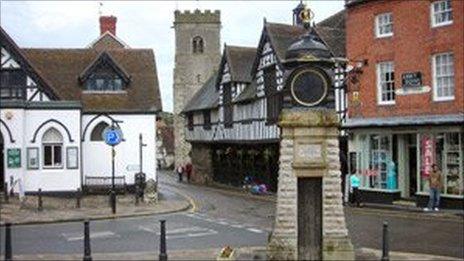How much of a rugby town is Rugby?
- Published
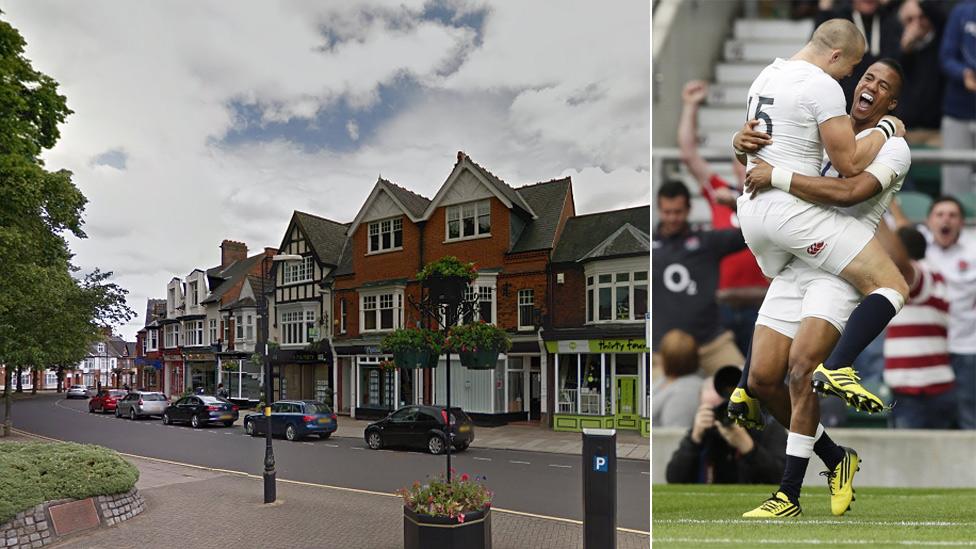
It's a nondescript town in the Midlands that shares a name with a global sport that was born there. But, as the Rugby World Cup gets under way, how much of a rugby town is Rugby?
There is no high-profile Premiership club attracting thousands of fans to the town every other weekend and no stadium staging World Cup matches.
But Rugby - location of the famous public school where the sport was said to be accidentally invented - is also home to a rugby museum. And, if you look a bit harder, there is a thriving rugby scene locally with six clubs.
And with a boost in tourism expected, the Warwickshire town has made plans to cash in on the sport's name.
An official Fanzone will show matches on a big screen, the borough council has spent about £1m on the World Cup and some pubs and restaurants have been refurbished.
But even so, Phil Blundell, who manages the Webb Ellis Museum, named after the schoolboy said to have created the game, says: "I think Rugby (the town) hasn't got the profile it should have.
"I travel around the world and I've been to several places where people have never heard of Rugby, don't know the sport originated in the town.
"I'm hoping that this World Cup will get it world-widely known... It is poetic, it is nice, it is something that every single person should know."

Why is Rugby the birthplace of the sport?
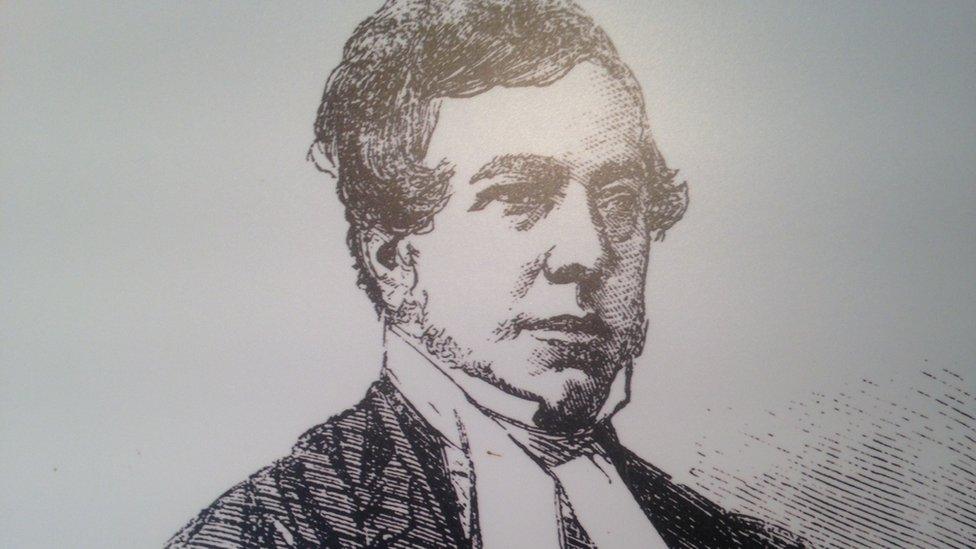
An image of William Webb Ellis is on show at the town's rugby museum
Although there were no formal rules for the game of football, during William Webb Ellis's time at Rugby School the practice was for the player catching the ball to move backwards prior to kicking it, the Webb Ellis Museum said.
It is reputed that Webb Ellis ran forward with the ball after catching it in 1823, thus establishing this distinctive element of the game.
The museum's record of this event comes from two letters written by former pupil Matthew Holbeche Bloxam, in 1876, four years after Webb Ellis's death, and 1880.
Museum manager Phil Blundell said: "William Webb Ellis and his contemporaries, as the boys left Rugby to go to university or the forces, they said 'this is the football we play at Rugby'."
But Bloxam, who was not a contemporary of Webb Ellis's at the time of his run, never revealed his own source on the subject.
The Old Rugby Society didn't begin research into the legend until 1895, by which time Bloxam was dead. Few people were alive who could remember Webb Ellis, and those who did believed that running with the ball was outlawed during his day.

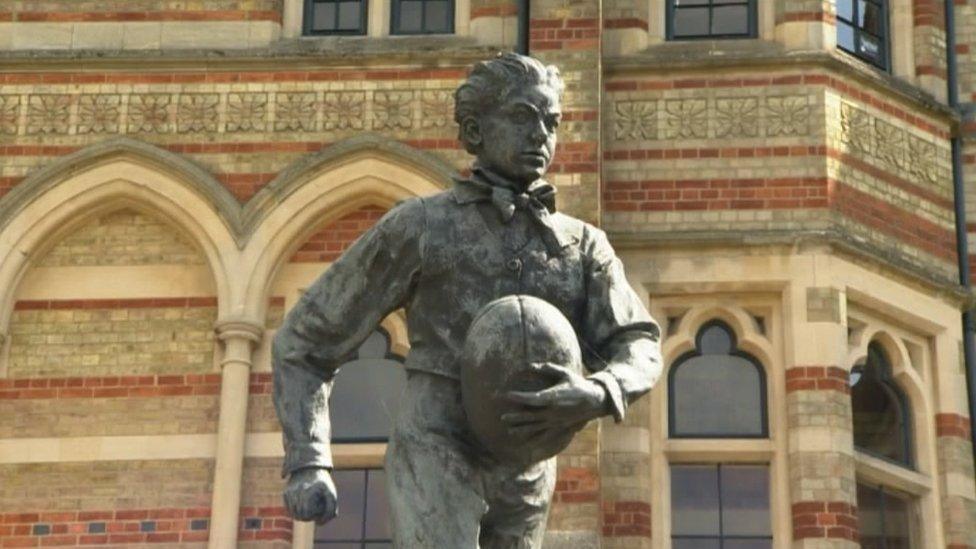
The William Webb Ellis statue on Dunchurch Road is outside Rugby School
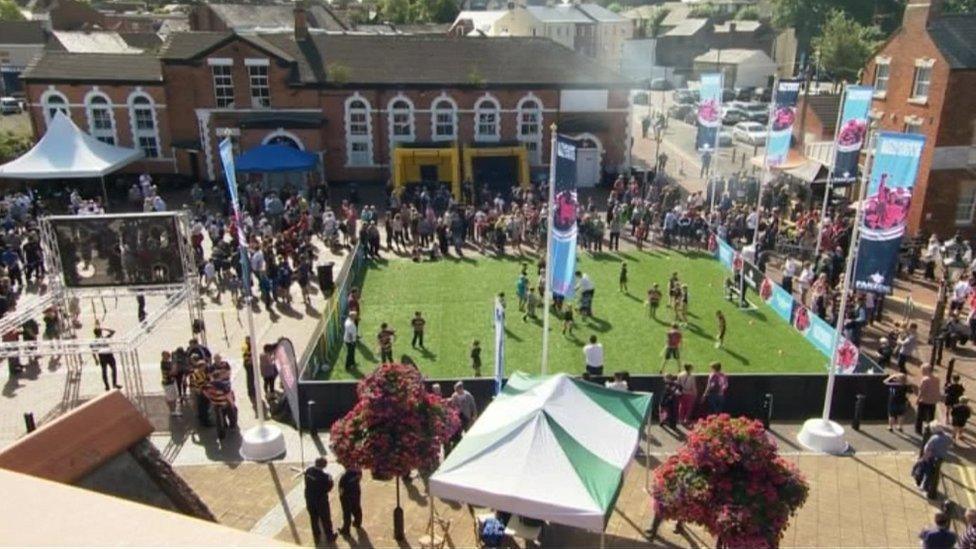
Old Market Place in Rugby, where people could view the Webb Ellis Cup on 16 August, will have a Fanzone showing games on a big screen
Rugby Lions, which was the town's most prominent rugby club and played in the top flight, went into liquidation in 2012 after 139 years and was demoted. But its various teams play on.
When vice-chairman Jeff Nowill went to Barcelona for a veterans tournament last year, clubs from France, Italy and Spain took part.
"(Some) didn't even know the sport heralded from the town of its name," he said. "These people were absolutely blown away. They wanted to take photos with us."
The club on Webb Ellis Road, though, is steeped in history - the logo boasts a red lion, the emblem of Town House at Rugby School, the birthplace of the sport.
And it also has the privilege of being one of only three teams in England allowed to wear an all-white strip, with England and the school being the others, according to the museum.
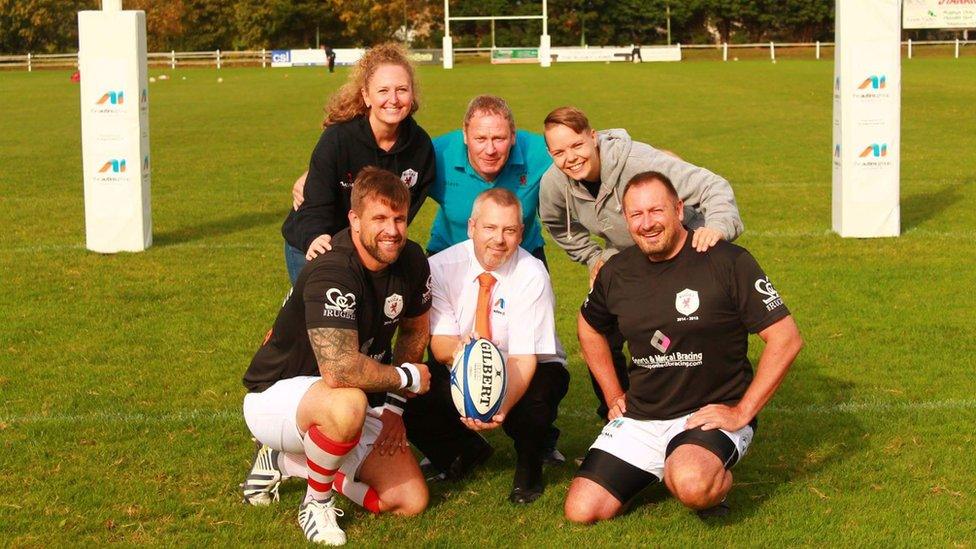
Jeff Nowill (bottom right) said Rugby Lions, Old Laurentians and Newbold-on-Avon all have about twice as many active players as they had in the 1980s
And it is not the only team in town.
Mr Nowill paints a picture of men wearing club blazers from teams spread "around the clock face of the market town" descending on the centre of Rugby on Saturday nights.
He said: "You can't wait to see players from other clubs and say 'how did you get on?'"
Mr Nowill, 47, said there were now twice as many senior players at Rugby Lions and some other clubs as there were in the 1980s, while Old Laurentians, for example, now had a "fantastic" juniors provision with 200 youngsters.
But while it may be the sport's grassroots players who compete on the town's pitches, rugby union's finest will be seen on the big screen in Rugby - the only town or city not staging World Cup matches with an official fanzone.
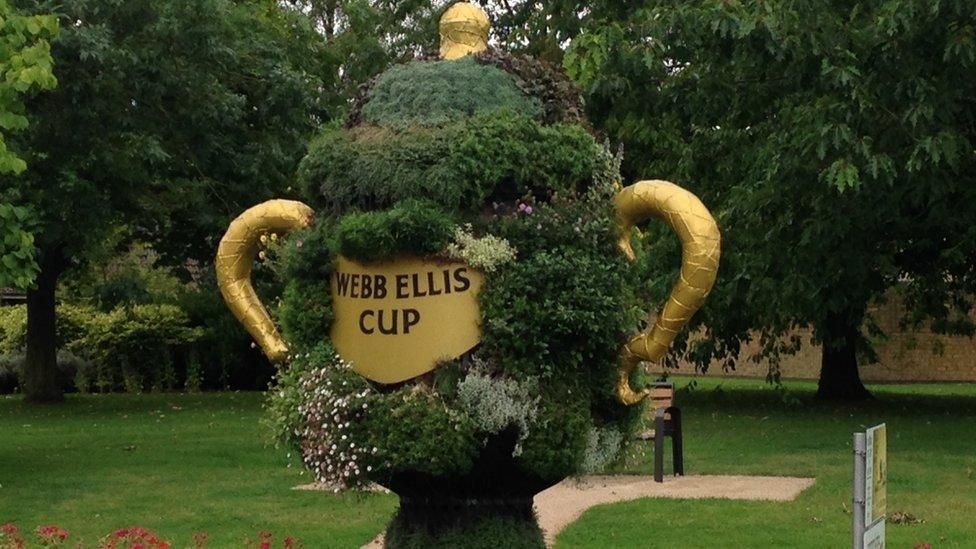
A floral trophy is on the corner of Warwick Street
The 2,000-capacity area in Old Market Place, a short walk from Rugby School, will be open on 17 days during the tournament, more than any other fanzone.
And the council said it was estimated millions of pounds would be spent by the public in the likes of hotels, shops and bars.
The Courthouse pub near the town hall said about £340,000 had been spent on a revamp and the council said half a dozen other pubs and restaurants had also been refurbished.
With three television sets in the pub, The Courthouse landlord Dennis Harrison said he would be "delighted" if income increased by 10% during the tournament.
Mr Harrison, 51, said: "We want to drag people in for the World Cup. We've had quite a few Americans, some Australians already. We've got the traditional four nations' flags up."
The council's spending of about £1m includes lighting the William Webb Ellis statue at night, street banners, toilets and other fanzone infrastructure, road improvements, town centre wi-fi, marketing and concerts in the fanzone space.
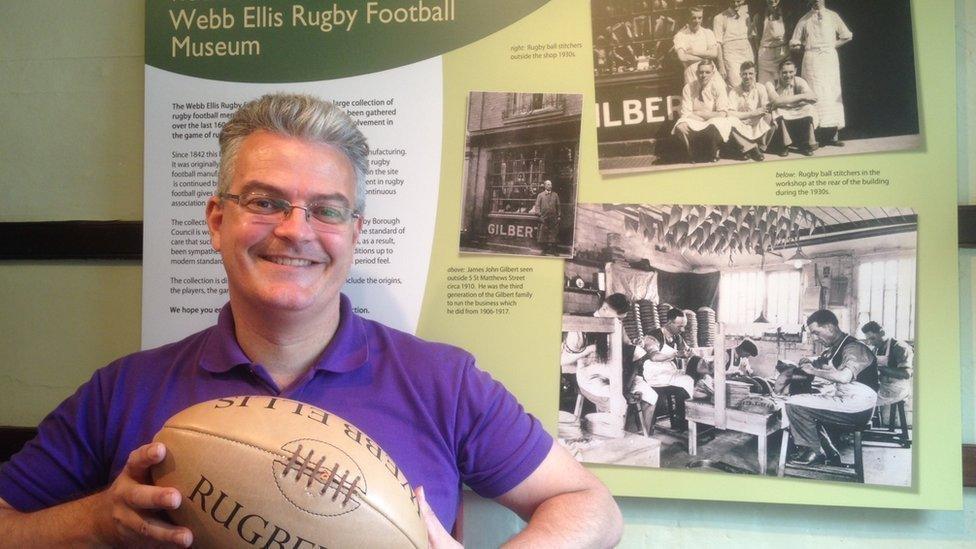
Museum manager Phil Blundell is hoping visitors numbers will soar during the World Cup
One expected beneficiary, the Webb Ellis Museum, said "coachload after coachload after coachload" had booked to visit it.
Manager Mr Blundell, a 45-year-old father-of-seven born in the town, estimated the free museum normally had 200 visitors a week, but this had doubled in recent months of pre-World Cup hype.
And during the six-week tournament he said museum visitor numbers "could treble or quadruple".
Similar areas have benefited before. Ahead of London 2012, for instance, a museum in Much Wenlock, Shropshire, was awarded lottery money to promote the sporting heritage of a town considered to have played a role in inspiring the modern Olympic movement.
The Webb Ellis Museum does not only tell the story of the sport's heritage - it is also part of it.
Formerly the home of Gilbert rugby ball makers, the museum said the first balls were stitched at its site in 1842 and the building has the "longest continuous association with the manufacture of any form of football".
By 1823 William Gilbert, boot maker to Rugby School, was already supplying balls to the school "when William Webb Ellis first picked up and ran with the ball", the firm itself says.
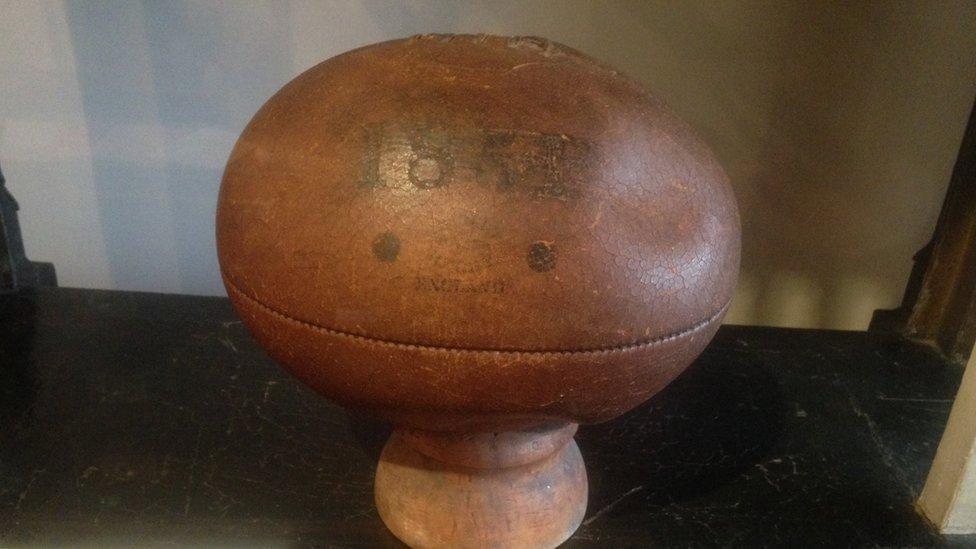
Rugby balls used to be more spherical, such as this one from 1851 made by William Gilbert
In the building's heyday four decades ago there were 200 people on site and today Webb Ellis Ltd still makes leather balls for souvenir purposes there - but one man now does it, twice a week.
The museum itself displays older more spherical balls based on the shape of a pig's bladder.
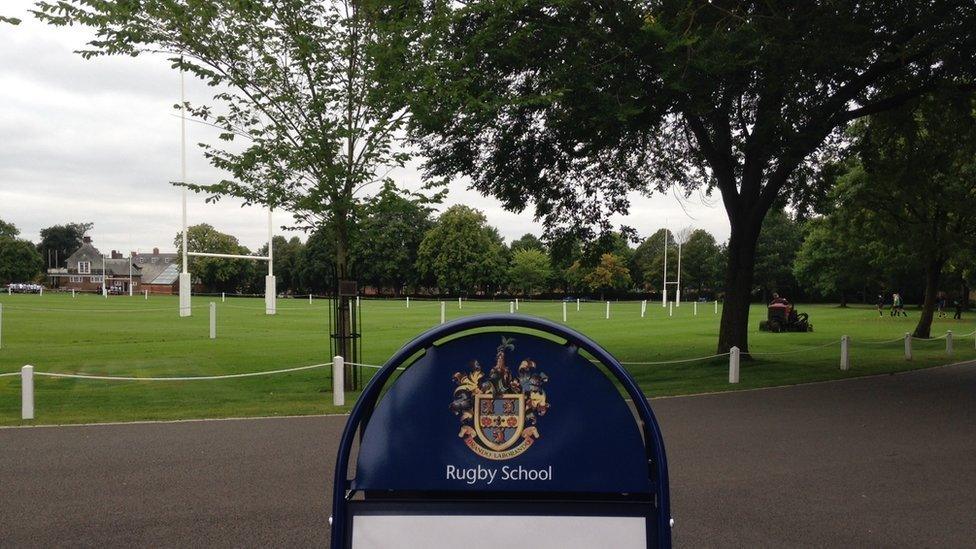
William Gilbert was already supplying balls to Rugby School "when William Webb Ellis first picked up and ran with the ball," Gilbert said
Today's youngsters will benefit from the World Cup planning. About 2,500 children - around half of them from the area - will learn about the origins of the sport in a new initiative.
Along with Rugby School and another independent school, Princethorpe College, the town's six state schools currently also play the sport, the council said.
Rugby High School, a grammar school for girls, play tag rugby, external.
And English rugby's governing body, the Rugby Football Union, said the area "has a vibrant playing community which is growing" and stated nearly all clubs offer rugby opportunities for women and girls.
Local rugby has had "high and lows," says Mr Blundell, who used to play for local team Newbold.
The World Cup being held in England may make no difference to the league status of Rugby Lions, Old Laurentians or Newbold. But it could make more people aware of the sporting legacy of the town.
- Published16 August 2015
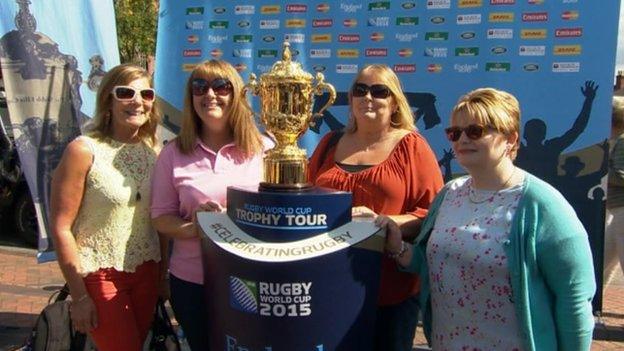
- Published7 January 2015
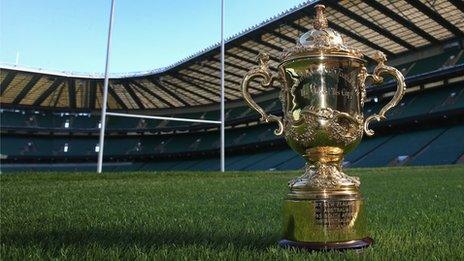
- Published1 February 2014
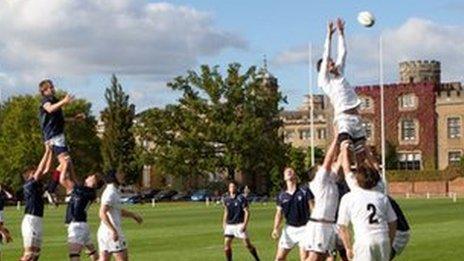
- Published23 May 2011
